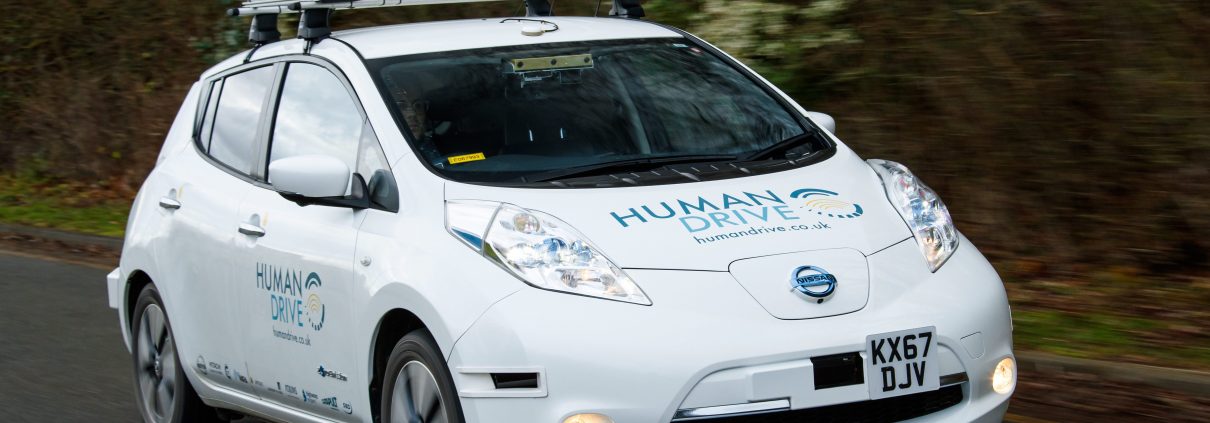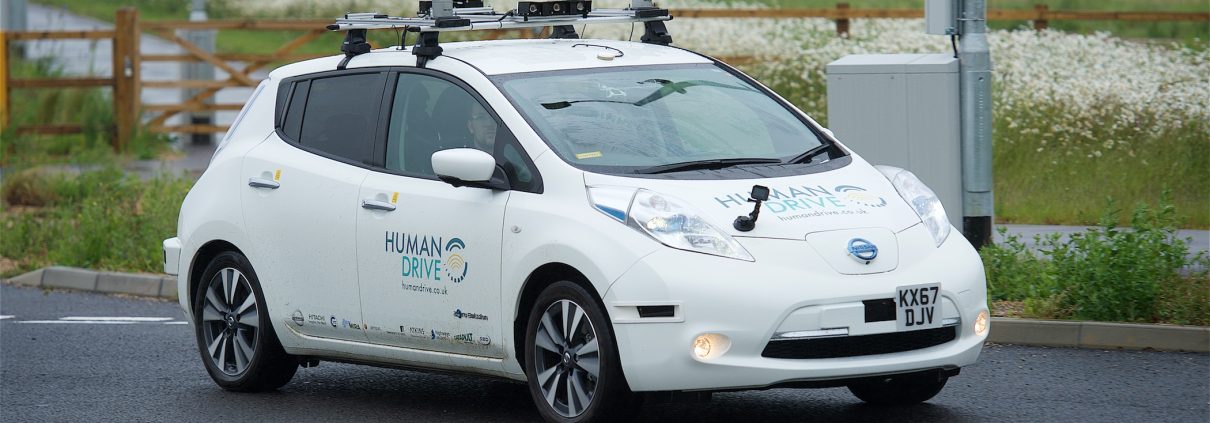HumanDrive project in countdown to Grand Drive
A 30-month Autonomous Vehicle project led by Nissan’s European Technical Centre will soon complete its primary aim – achieving the UK’s most complex journey with autonomous drive. Before the end of 2019 the HumanDrive vehicle will self-navigate a 230-mile journey over country roads, high speed roundabouts, A-Roads and motorways, all through live traffic.
In addition, the HumanDrive project will seek to take autonomous technology to the next level in terms of ride comfort and adaptability by adopting natural road positioning and a more human-like driving style.
To achieve this grand aim, the project has drawn upon the expertise of a world-leading consortium:
- Nissan Technical Centre Europe (lead partner) is leading on the development and testing of the next generation autonomous vehicle that will soon complete the Grand Drive
- Hitachi is developing an advanced machine-learning Artificial Intelligence to control the vehicles perception and decision making
- University of Leeds is responsible for defining the user requirements and developing a driver risk model using trials data captured from their simulator and live trials
- Cranfield University is validating the technology through a digital model, and has supported the trials, demonstration and experimental validation, utilising its advanced Multi-User Environment for Autonomous Vehicle Innovation (MUEAVI) test track
- Atkins Ltd is ensuring that all cyber security precautions have been considered, including the publication of the Cyber Security Framework that provides assurance to the public that the security risks associated with CAV technology are being appropriately managed
- Highways England is exploring the impact of CAVs on the transport system
- Aimsun Ltd is supporting Highways England in the study of the impact on the transport system
- HORIBA MIRA is providing test facilities and helping to ensure the safety of other road users, as well as passengers and safety driver
- SBD Automotive is supporting the cyber security aspects of the project
- Connected Places Catapult is responsible for project management, dissemination and safety case elements of the project.
Robert Bateman, HumanDrive Project Manager for Nissan Technical Centre Europe, said: “We are getting close to delivering on our main aim – a 230-mile Grand Drive across the UK, through live traffic and some very challenging road networks. Our consortium partners have given a tremendous push to get us to this point, and we’ve made some significant learnings along the way as we develop this human-like autonomous driving style.”
Rav Babbra, Innovation Lead, Automotive Team, Innovate UK, said: “The UK is at the forefront of automotive innovation. The HumanDrive project is a fantastic example of the dynamic collaboration of businesses and universities supported by the Intelligent Mobility fund.”
Next year the HumanDrive consortium intends to demonstrate the technology to celebrate the people, ideas, resources and technology that have helped make this project a reality. For more information and to stay up to date, follow @HumanDriveCAV or contact humandrive@ts.catapult.org.uk
Advanced simulation tools supporting HumanDrive and wider CAV roll out
- Software packages developed to deliver a highly accurate digital twin of the real world, and to merge and manage multiple simulation platforms
- Both simulation tools being used by HumanDrive project partners to achieve 230-mile autonomous journey later this year, and to support wider CAV roll out
Visualisation experts at the Connected Places Catapult (CPC) have developed a unique and innovative simulation tool to support the HumanDrive project and wider Connected and Autonomous Vehicle (CAV) development, enabling project partners and developers to visualise trials data in a highly accurate digital twin of the real world.
Built following a series of real-world and simulated trials carried out by project partners Cranfield University and the University of Leeds, the tool is helping the HumanDrive team to better understand how humans drive. Uniquely, it enables developers to interrogate and filter data – collected from real-world and simulation trials, human factor observations and monitoring of drivers, and on-board sensor equipment such as lidar – with a specific question in mind.
Martin Pett, Principal Technologist at the CPC, said: “We needed to create a digital twin of the trial environment in a user-friendly format so that project partners can replay and filter reams of data for deeper analysis. For example, how the trial participant positioned themselves when they passed a cyclist, their acceleration or braking profiles, how they held the steering wheel, or how weather conditions affected their speed.”
“The tool is built on the Unity platform – a cross-platform, real-time engine for simulation construction commonly used by game developers – and allows you to replay the entire trial virtually, whilst seeing all the data that was generated from multiple participants, all in one place and time synchronised. It really is a fantastic tool that can be used by individuals who may not have modelling experience.”
Also developed by the CPC is a light-weight software infrastructure called ‘simulation to simulation’ (s2s) that helps integrate simulators and simulations. Simulation has the potential to allow CAV developers to explore thousands of design iterations in a rapid and cost-effective manner, adapting real-world scenarios as required (from changing weather conditions to manipulating physical environment and introducing hazards) with minimal input. s2s provides a means by which simulations may be joined together to support this goal.
Ecaterina McCormick, Senior Technologist at the CPC, said: “This free piece of software – which is unique to the transport sector – allows users to bring together and effectively manage different simulation packages in a controllable, simple way. Different simulation packages have their strengths and weaknesses – s2s allows you to get the best out of them all, and we’ve made it free for people to use. Already there is great interest from world-leading institutions.”
HumanDrive is being developed by a world-leading consortium and will culminate in a 200-mile, live-traffic journey that is both driverless and human-like. The HumanDrive consortium consists of Nissan’s European Technical Centre, Hitachi, HORIBA MIRA, Atkins Ltd., Aimsun Ltd., SBD Automotive, University of Leeds, Highways England, Cranfield University and the Connected Places Catapult.
###
Download the Digital Twin Case Study.
Download the s2s software.
Watch Martin Pett deliver an IET presentation about the Digital Twin tool.













